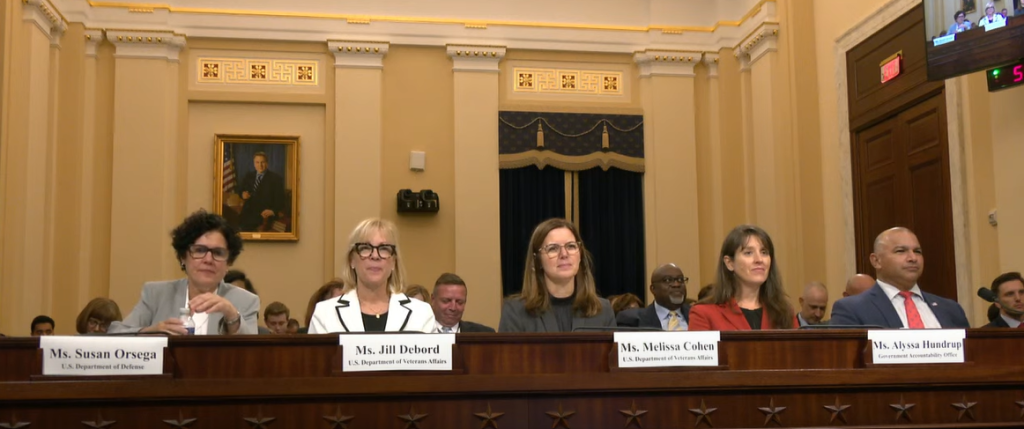
⚡NIMITZ NEWS FLASH⚡
“Mission Transition: Evaluating Mental Health Support Programs for Separating Servicemembers”
House Veterans Affairs Committee Hearing & Business Meeting
September 10, 2024 (recording here)
HEARING INFORMATION
Witnesses:
- Ms. Melissa Cohen: Executive Director, Outreach, U.S. Department of Veterans Affairs, on behalf of Veterans Benefits Administration
- Ms. Jill Debord: Executive Director, U.S. Department of Veterans Affairs, on behalf of Veterans Health Administration
- Ms. Susan Orsega: Deputy Assistant Secretary of Defense, U.S. Department of Defense, on behalf of Health Services Policy and Oversight
- Ms. Alyssa Hundrup: Director of Health Care, Government Accountability Office
- Mr. James Rodriguez: Assistant Secretary for Veterans’ Employment and Training Service, U.S. Department of Labor
Keywords mentioned:
- Transition Assistance Program (TAP), inTransition program, Solid Start program, “warm handover” process, outreach, communication, performance metrics, interagency coordination, employment training, at-risk service members
IN THEIR WORDS
“The Government Accountability Office has identified numerous ways that we're failing to connect our service members with mental health services. The warm handover process is not happening as it should. Who in the federal government […] is accountable, and what can we do to change it?”-Chairman Derrick Van Orden
“I know DoD has many other priorities, important priorities. Their job is to fight and win war, but I also believe that taking proper care of service members and their families during the transition out of the military helps enable the DoD to do their core mission.”-Ranking Member Mike Levin
“We've also heard, on a structural level, that there is a pervasive and lingering culture across the DoD that makes TAP a back burner issue, or worse, they just don't care. That's unacceptable. This must be a partnership; VA can't carry the weight all on its own shoulders.”-Rep. Morgan McGarvey

OPENING STATEMENTS FROM THE SUBCOMMITTEE
- Chairman Van Orden thankedRanking Member Levin for his dedication and professionalism in supporting field hearings, mentioning a recent hearing in Wisconsin. He discussed the importance of ensuring that transitioning service members receive adequate mental health support before, during, and after their transition to civilian life. The Chairman shared his personal experience with the loss of 21 Navy SEAL friends to suicide, underscoring the urgent need for reforms in the Transition Assistance Program (TAP). He voiced frustration with the Department of Defense’s (DoD) lack of response to previous recommendations and called for accountability and concrete solutions to prevent veteran suicides.
- Ranking Member Levin reflected on the importance of supporting service members in their transition to civilian life, highlighting the need to connect veterans with mental health services early in the process to prevent crises. He mentioned legislative efforts such as the Transition to Improvement by Estimating Risk (TIER) Act and the Ensuring Veterans’ Smooth Transition (EVEST) Act, aimed at improving the transition process. The Ranking Member called for better coordination among the seven federal agencies involved in TAP and raised concerns about gaps in services for veterans at risk during their transition.
SUMMARY OF KEY POINTS
- Ms. Cohen spoke on the VA’s efforts to increase transparency, improve collaboration, and prioritize veterans’ needs during their transition from military to civilian life. She outlined various VA programs, including the Solid Start program, which connects veterans with mental health services, and the VA Liaison Program, which facilitates health care transitions before discharge. Ms. Cohen mentioned that over 14,000 service members received coordinated healthcare transitions in 2023, and she pointed to ongoing efforts to improve outreach and connection rates for transitioning veterans.
- Ms. Orsega described the DoD’s commitment to providing mental health services for transitioning service members, noting that this period is often marked by vulnerability to suicide and other mental health challenges. She detailed the DoD’s inTransition program, designed to ensure continuity of care for service members leaving the military, and the Transition Assistance Program (TAP), which provides resources to help members reintegrate into civilian life. Ms. Orsega acknowledged ongoing efforts to improve the reach and effectiveness of these programs and committed to addressing concerns raised by recent reports.
- Ms. Hundrup provided an overview of the GAO’s findings on the effectiveness of DoD and VA programs that support transitioning service members. She spotlighted significant gaps in the inTransition program, including a failure to contact 70% of eligible participants and delays in identifying service members until months after their separation. Ms. Hundrup also expressed concern over the DoD’s “warm handover” process, which aims to connect service members with necessary services but often falls short. She called for stronger oversight, earlier identification, and improved outreach methods to ensure veterans receive the support they need.
- Mr. Rodriguez spoke about the importance of employment in promoting veterans’ mental and physical well-being. He discussed the Department of Labor’s (DoL) efforts to provide training and job placement services through the Employment Navigator and Partnership Program and the Off-Base Transition Training program, which supports veterans who may have missed the traditional transition process. Mr. Rodriguez also spoke about programs like the Homeless Veterans Reintegration Program (HVRP), which helps veterans facing homelessness secure employment and access mental health and addiction services. He urged Congress to invest more in veteran employment programs, as they play a crucial role in preventing unemployment-related mental health crises.
- Ranking Member Levin raised concerns that tens of thousands of high-risk service members were not attending their required TAP classes. He asked what the DoD was doing to enforce these timelines and hold services accountable. Ms. Orsega acknowledged that there was still significant work to be done. While her office was not directly responsible for TAP, she committed to relaying the concerns back to the military departments and working to improve policies that influence the program. She highlighted the importance of reducing stigma, increasing awareness, and promoting access to mental health resources.
- Ranking Member Levin emphasized that the issue was indicative of a broader cultural problem within the DoD regarding veterans’ transitions. He then asked Ms. Hundrup about the differences between the VA’s Solid Start program and the DoD’s inTransition program in terms of effectiveness. Ms. Hundrup explained that the VA’s Solid Start program had been more successful in reaching veterans, with over 70% successful contact, compared to the inTransition program’s difficulty in reaching enrollees. She attributed this to Solid Start’s more robust outreach strategy, which included multiple phone calls throughout the year.
- Rep. Ramirez raised concerns about veterans’ lack of awareness regarding the mental health resources available to them. She asked what efforts the VA and DoD were making to ensure that veterans, especially those with unplanned transitions or disabilities, were informed about their benefits and resources.
- Ms. Cohen described various outreach efforts, including the Off-Base Transition Training program, which offers virtual opportunities for veterans to learn about benefits. She also discussed the VA’s new outreach strategy focused on underserved communities, describing upcoming efforts in rural and homeless veterans and women veterans for FY 2025. Ms. Orsega emphasized that the DoD’s inTransition program aimed to connect service members to mental health services early in their transition. She added that each service member’s needs are unique, and the DoD is working to create a comprehensive system of support for those with different transition challenges.
- Rep. McGarvey expressed frustration over the lack of service member attendance in TAP classes, noting that a GAO report showed nearly 25% of service members did not attend TAP. He asked what steps were being taken to ensure all service members, particularly those at risk of a difficult transition, attended TAP. Ms. Orsega reiterated that while her office did not directly oversee TAP, she was committed to relaying these concerns back to the military departments. She explained that individual military departments were responsible for ensuring TAP attendance but acknowledged the need for stronger enforcement.
- Chairman Van Orden confronted Ms. Cohen about a claim in her testimony that the VA had contacted 14,000 veterans, asking how many total veterans were transitioning. Ms. Cohen deferred to her colleague, who confirmed that it represented a small percentage of the total transitioning service members. The Chairman then criticized Ms. Orsega for the DoD’s lack of accountability regarding TAP implementation, demanding a list of specific individuals responsible for addressing TAP failures. Ms. Orsega responded that individual military service departments were responsible for TAP, but she committed to taking the Chairman’s concerns back to those departments.
- Ranking Member Levin asked for more specifics regarding why the VA’s Solid Start program had a more effective outreach strategy than the DoD’s inTransition program for connecting veterans in need of mental health services. Ms. Hundrup explained that the success of Solid Start boiled down to the level of effort put into outreach. Solid Start sends an advanced email, delivers a packet of information, and makes up to seven phone calls to veterans at three different points over a year. In contrast, the inTransition program makes only one or two calls due to resource constraints and unenrolls individuals after failed contact attempts. Ms. Hundrup also noted that the overlap between Solid Start and inTransition calls, occurring at the same time, could cause confusion among veterans. She advocated for the Joint Executive Committee to evaluate both programs’ effectiveness and streamline outreach efforts to avoid overwhelming veterans.
- The Ranking Member asked, considering the complexity of oversight, what Ms. Hundrup would do if she were in Ms. Orsega’s position to implement some of the GAO’s recommendations. Ms. Hundrup advised that the DoD should focus on leadership accountability, specifically holding the Defense Health Agency (DHA) responsible for overseeing the inTransition program. She noted the lack of performance metrics and goals in the current program, run by contractors, and called for the DoD to set specific outreach goals and ensure earlier engagement with veterans.
- Responding to the Ranking Member’s prompt, Ms. Orsega committed to following up on the GAO recommendations and planned to address them at the beginning of the next fiscal year. She expressed her appreciation for the recommendations but mentioned there were some differences in opinion on how they should be implemented.
- Chairman Van Orden asked for details on the accountability of TAP counselors and how service members are being connected with transition resources. Ms. Orsega restated that her mission was to provide detailed information on the accountability of service members’ TAP experiences, including who is responsible and how they are connected with counselors. She committed to reporting back with this information.
- The Chairman demanded that Ms. Orsega provide specific names and departments responsible for these efforts by the end of the month. He passionately emphasized the bipartisan frustration over the lack of accountability in the DoD and urged action on this critical issue, especially in light of veteran suicides.
SPECIAL TOPICS
🖤 Mental health and suicide:
- The largest topics related to mental health and suicide covered throughout the hearing included the transition period from service to civilian life, “warm handover” failures, the Solid Start program, the inTransition program, and stigma reduction.
📋 Government contracting:
- Ms. Hundrup expressed concerns over the inTransition program, noting that it is operated by contractors who are not held to specific performance metrics. She stressed the need for greater oversight and accountability of contractors running key programs like inTransition, pointing out that it is currently underperforming without effective leadership oversight from the Defense Health Agency (DHA).
🧠 Traumatic brain injury (TBI):
- Ms. Orsega mentioned that service members diagnosed with moderate to severe traumatic brain injury (TBI) within a year of separation are automatically enrolled in the inTransition program. This initiative aims to provide mental health services for service members with TBI, but its effectiveness has been limited due to poor outreach and enrollment strategies.
♀️ Women veterans:
- Ms. Cohen outlined ongoing efforts to improve outreach to women veterans, who often face unique challenges in accessing mental health and other support services. In fiscal year 2025, the VA is focusing on women veterans as one of the priority areas for outreach, alongside rural veterans and homeless veterans.
ADD TO THE NIMITZ NETWORK
Know someone else who would enjoy our updates? Feel free to forward them this email and have them subscribe here.
